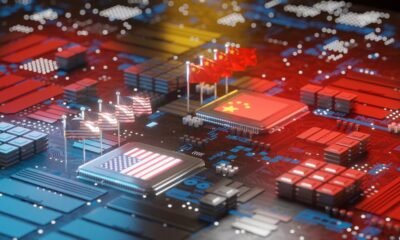Tools & Platforms
Arm Holdings Invests £100M in Bristol AI Chip Design Center, Creating 100 Jobs

In a move that underscores the United Kingdom’s ambitions to solidify its position as a global hub for semiconductor innovation, Cambridge-based Arm Holdings has announced plans to establish a new chip design center in Bristol. This development, reported by the BBC, involves an investment of up to £100 million over the next five years and aims to create around 100 high-skilled jobs in the region. Arm, renowned for its energy-efficient processor designs that power billions of devices worldwide, is targeting advancements in artificial intelligence, automotive technologies, and data centers with this expansion.
The Bristol site will focus on developing next-generation central processing units (CPUs) and graphics processing units (GPUs), building on Arm’s existing ecosystem that includes partnerships with tech giants like Apple, Qualcomm, and Samsung. This initiative comes at a time when the global chip industry is grappling with supply chain disruptions and geopolitical tensions, particularly around U.S.-China trade relations. By expanding domestically, Arm is not only diversifying its operations but also tapping into the UK’s growing pool of engineering talent, much of which has been nurtured by universities in the southwest of England.
Strategic Growth Amid Global Challenges As the UK government pushes forward with its Modern Industrial Strategy, initiatives like Arm’s Bristol center align closely with national goals to boost the digital economy to £1 trillion by the end of the decade. Recent reports from GOV.UK highlight the sector’s potential, emphasizing investments in AI, quantum computing, and cybersecurity to drive economic growth. Industry insiders note that this move by Arm could catalyze further investments in the region, potentially transforming Bristol into a semiconductor hotspot akin to Cambridge’s Silicon Fen.
However, challenges persist. Talent shortages remain a critical hurdle, with the UK facing competition from Silicon Valley and emerging Asian tech hubs. Posts on X, formerly Twitter, from users like those at McKinsey & Company, discuss how frontier technologies such as agentic AI are redefining business, yet underscore the need for skilled workers in design and electronic design automation (EDA). Arm’s expansion addresses this by partnering with local institutions to train engineers, but broader systemic issues, including visa restrictions for international talent, could impede progress.
Innovation at the Edge of Computing Looking ahead to 2025, trends identified in McKinsey’s technology trends outlook point to the integration of AI with edge computing as a pivotal shift. Arm’s designs are particularly suited for this, enabling real-time decision-making in devices from autonomous vehicles to smart factories. X posts from tech analysts highlight how combinations of AI, IoT, and 5G are expanding strategic applications, with companies like Tesla and Amazon leading the charge in innovation management.
The UK’s digital sector already contributes over £150 billion annually to the economy, according to Statista, employing 1.7 million people. Arm’s Bristol venture could amplify this by fostering collaborations in emerging fields like bio-based materials and decentralized renewable energy, as speculated in forward-looking X discussions about post-2025 sectors. Yet, geopolitical frictions and supply chain fragility, as noted in recent UKHotViews analyses, pose risks, with export controls potentially affecting chip production.
Policy Support and Future Prospects The Labour government’s tech policy for 2025, detailed in Taylor Wessing’s insights, emphasizes regulatory frameworks to support digital growth while addressing ethical concerns in AI. Arm’s expansion benefits from such policies, including grants for R&D in critical technologies. Industry observers on X, such as those from Smart Sync Investment Advisory Services, warn of rising tech complexity and cost pressures, yet view semiconductors as the “new oil” powering everything from quantum computing to electric vehicles.
To mitigate these, Arm is investing in domestic silicon ramps, with reports indicating shipments of advanced chips like Huawei’s Ascend series influencing global markets. This positions the UK to compete in the intensifying global tech race, as outlined in Digital Watch Observatory. For industry insiders, the key takeaway is clear: strategic expansions like this not only bolster economic resilience but also pave the way for breakthroughs in AI-driven diagnostics and telemedicine, ensuring the UK’s tech sector remains at the forefront of innovation.
Economic Ripple Effects and Long-Term Vision Beyond immediate job creation, Arm’s Bristol center is expected to stimulate local economies through supplier networks and startup incubators. Data from Financial Times archives show how tech growth has spread beyond the southeast, with “tech towns” like Burnley benefiting from similar booms. Current sentiment on X, including posts from Icetea Software, emphasizes AI’s role in reducing latency through edge computing, which could enhance sectors like agri-tech and mental health apps.
Ultimately, as the UK navigates post-Brexit realities, investments in homegrown tech talent and infrastructure will be crucial. With McKinsey projecting 13 tech trends shaping 2025, including multilingual generative AI, Arm’s move exemplifies proactive adaptation. By leveraging its strengths in efficient chip design, the company—and the nation—stands poised to thrive in an era where digital innovation drives sustainable growth and societal benefits.
Tools & Platforms
NVIDIA Partners with Black Tech Street to Bring AI Revolution to Tulsa, Home of $10,000 Remote Worker Grants

NVIDIA has formed a major partnership with Black Tech Street to develop Tulsa’s historic Greenwood District into a national artificial intelligence center, marking a significant economic development initiative for the area once known as Black Wall Street.
Partnership Overview and Goals
The collaboration, formalized through a Memorandum of Understanding, aims to train up to 10,000 people in AI technologies while supporting local startups and positioning Tulsa as a leader in artificial intelligence innovation. The initiative centers on creating the Greenwood AI Center of Excellence within the district that was devastated by the 1921 Tulsa Race Massacre.
“This is going to have an incredible impact on Tulsa,” said Terrance Billingsley II, CEO of Black Tech Street. “NVIDIA is the most valuable company in the world, leading the most important technological revolution in human history.”
The partnership leverages Tulsa’s recent designation as a federal Tech Hub, which awarded the city $51 million from the U.S. Economic Development Administration. Of that funding, $10.6 million will specifically support the AI center development.
Comprehensive Training and Education Program
The initiative’s training component will reach across multiple educational institutions and community organizations. Partners include Langston University, Tulsa Community College, and Oklahoma State University, creating a comprehensive educational ecosystem for AI development.
Educators will receive certification through the NVIDIA Deep Learning Institute University Ambassador Program, providing access to cloud-based tools powered by NVIDIA GPUs. This infrastructure aims to ensure high-quality, standardized training across participating institutions.
The 10,000-person training target represents an ambitious scale that could significantly impact Tulsa’s workforce development. The program plans to serve students, workers, and entrepreneurs throughout the region, creating multiple pathways for AI skill development.
Economic Development and Startup Support
Beyond education, the partnership includes substantial business development components. NVIDIA will provide local startups access to its Inception program, which offers early-stage companies technology support and networking opportunities crucial for growth in competitive tech markets.
The collaboration also includes access to advanced computing resources, including GPUs and cloud platforms essential for AI development projects. These resources typically require significant capital investment, making the partnership valuable for local entrepreneurs and researchers.
Billingsley emphasized the local economic focus: “The next step is getting NVIDIA integrated into the community, getting certain programs up and running for people to take advantage of, hosting different events, and trying to architect what the big play that is going to transform our local economy is going to be.”
Strategic Location and Historical Significance
The choice of Greenwood District for this initiative carries particular historical weight. The area was once known as Black Wall Street, representing one of the most prosperous Black communities in early 20th-century America before its destruction in the 1921 Tulsa Race Massacre.
This partnership positions AI development within a community that has symbolic importance for Black economic empowerment and entrepreneurship. The initiative aims to create high-paying tech jobs and drive entrepreneurship in an area working to rebuild its economic foundation.
Political and Community Support
The partnership has garnered support from political leaders across party lines. U.S. Senator James Lankford highlighted Oklahoma’s growing technology profile: “Oklahoma is fast becoming a national leader in next-generation innovation, from AI to aerospace and beyond. Whether it is in Tulsa or across the state, Oklahoma is proving that you do not have to be on the coasts to be on the cutting edge.”
Tulsa Mayor Monroe Nichols expressed enthusiasm for the economic opportunities: “NVIDIA and Black Tech Street are setting the stage for new jobs for Tulsans, and I am eager to see how this investment in innovation will open more doors of opportunity for our community.”
Building on Tulsa’s Remote Work Success
This AI initiative builds upon Tulsa’s proven track record in attracting talent through innovative programs. The city’s Tulsa Remote program, which offers $10,000 grants to remote workers who relocate to the city, has successfully attracted approximately 3,500 participants since 2018.
Recent economic analysis found that Tulsa Remote generates more than $4 in community benefits for every $1 spent, demonstrating the city’s ability to create successful workforce attraction programs. Participants have collectively generated $622 million in direct employment income, with 70% remaining in the city after completing the program.
Industry Partnership Framework
Louis Stewart, NVIDIA’s head of ecosystem development, emphasized the collaborative approach: “Our collaboration with Black Tech Street and the larger Tulsa ecosystem is helping prepare and equip all segments of the workforce to operate and sustain transformative technology that is building America’s future.”
The partnership extends beyond NVIDIA and Black Tech Street to include Tulsa Innovation Labs, Microsoft, Langston University, and the Tulsa Economic Development Corporation. This multi-stakeholder approach aims to create a comprehensive support system for AI development and adoption.
Future Expansion Potential
The agreement establishes a foundation for potential expansion across Oklahoma, suggesting the initiative could serve as a model for other communities seeking to develop AI capabilities. The collaborative framework developed in Tulsa could be replicated in other regions working to participate in the artificial intelligence economy.
The partnership represents a significant investment in both Tulsa’s economic future and the broader democratization of AI education and development opportunities beyond traditional tech centers.
Tools & Platforms
5-Week AI Mentorship for Startups in SF

OpenAI has unveiled a new initiative aimed at nurturing the next generation of artificial intelligence innovators, marking a strategic push into talent development amid intensifying competition in the AI sector. The program, dubbed OpenAI Grove, targets early-stage entrepreneurs who are either pre-idea or in the nascent phases of building AI-focused companies. According to details shared in a recent announcement, the five-week mentorship scheme will be hosted at OpenAI’s San Francisco headquarters, providing participants with hands-on guidance from industry experts and access to cutting-edge tools.
The program’s structure emphasizes practical support, including technical assistance, community building, and early exposure to unreleased OpenAI models. As reported by The Indian Express, participants will have opportunities to interact with new AI tools before their public release, fostering an environment where budding founders can experiment and iterate rapidly. This comes at a time when AI startups are proliferating, with OpenAI positioning itself as a hub for innovation rather than just a technology provider.
A Strategic Move in AI Talent Cultivation OpenAI’s launch of Grove reflects a broader effort to secure its influence in the rapidly evolving AI ecosystem, where retaining and attracting top talent is crucial. By offering mentorship to pre-seed founders, the company aims to create a pipeline of AI-driven ventures that could potentially integrate with or complement its own technologies. Recent posts on X highlight enthusiasm from the tech community, with users noting the program’s potential to accelerate startup growth through exclusive access to OpenAI’s resources.
Industry observers see this as OpenAI’s response to competitors like Anthropic and Grok, which have also been aggressive in talent acquisition. The first cohort, limited to about 15 participants, is set to run from October 20 to November 21, 2025, with applications closing on September 24. As detailed in coverage from CNBC, the initiative includes in-person sessions focused on co-building prototypes with OpenAI researchers, underscoring a hands-on approach that differentiates it from traditional accelerator programs.
Benefits and Broader Implications for Startups Participants in Grove stand to gain more than just technical know-how; the program promises a robust network of peers and mentors, which could be invaluable for fundraising and scaling. Early access to unreleased models, as mentioned in reports from NewsBytes, allows founders to test ideas with state-of-the-art AI capabilities, potentially giving them a competitive edge in a market where speed to innovation is key.
This mentorship model aligns with OpenAI’s history of fostering external ecosystems, similar to its past investments in startups through funds like the OpenAI Startup Fund. However, Grove appears more focused on individual founders, particularly those without formal teams or funding, addressing a gap in the startup support system. Insights from The Daily Jagran emphasize how the program could help participants raise capital or refine their business models, drawing on expert guidance to navigate challenges like ethical AI development and market fit.
Challenges and Future Outlook While the program has generated buzz, questions remain about its scalability and inclusivity. With only 15 spots in the initial cohort, selection will be highly competitive, potentially favoring founders with existing connections in the tech world. Recent news on X suggests mixed sentiments, with some praising the initiative for democratizing AI access, while others worry it might reinforce Silicon Valley’s dominance in the field.
Looking ahead, OpenAI plans to run Grove multiple times a year, potentially expanding its reach globally. As covered in TechStory, this could evolve into a cornerstone of OpenAI’s strategy to build a supportive community around its technologies, much like how Y Combinator has shaped the broader startup world. For industry insiders, Grove represents not just a mentorship opportunity but a signal of OpenAI’s commitment to shaping the future of AI entrepreneurship, ensuring that innovative ideas flourish under its umbrella.
Potential Impact on the AI Innovation Ecosystem The introduction of Grove could catalyze a wave of AI startups, particularly in areas like generative models and ethical AI applications, by providing resources that lower barriers to entry. Founders selected for the program will benefit from personalized feedback loops, helping them avoid common pitfalls in AI development such as data biases or scalability issues.
Moreover, this initiative underscores OpenAI’s evolution from a research lab to a multifaceted player in the tech industry. By mentoring early-stage talent, the company may indirectly fuel advancements that enhance its own ecosystem, creating a virtuous cycle of innovation. As the AI sector continues to mature, programs like Grove could play a pivotal role in distributing expertise more evenly, empowering a diverse array of entrepreneurs to contribute to technological progress.
Tools & Platforms
Robinhood CEO says just like every company became a tech company, every company will become an AI company—but faster

Earlier advances in software, cloud, and mobile capabilities forced nearly every business—from retail giants to steel manufacturers—to invest in digital transformation or risk obsolescence. Now, it’s AI’s turn.
Companies are pumping billions of dollars into AI investments to keep pace with a rapidly changing technology that’s transforming the way business is done.
Robinhood CEO Vlad Tenev told David Rubenstein this week on Bloomberg Wealth that the race to implement AI in business is a “huge platform shift” comparable to the mobile and cloud transformations in the mid-2000s, but “perhaps bigger.”
“In the same way that every company became a technology company, I think that every company will become an AI company,” he explained. “But that will happen at an even more accelerated rate.”
Tenev, who co-founded the brokerage platform in 2013, pointed out that traders are not just trading to make money, but also because they love it and are “extremely passionate about it.”
“I think there will always be a human element to it,” he added. “I don’t think there’s going to be a future where AI just does all of your thinking, all of your financial planning, all the strategizing for you. It’ll be a helpful assistant to a trader and also to your broader financial life. But I think the humans will ultimately be calling the shots.”
Yet, Tenev anticipates AI will change jobs and advised people to become “AI native” quickly to avoid being left behind during an August episode of the Iced Coffee Hour podcast. He added AI will be able to scale businesses far faster than previous tech booms did.
“My prediction over the long run is you’ll have more single-person companies,” Tenev said on the podcast. “One individual will be able to use AI as a huge accelerant to starting a business.”
Global businesses are banking on artificial intelligence technologies to move rapidly from the experimental stage to daily operations, though a recent MIT survey found that 95% of pilot programs failed to deliver.
U.S. tech giants are racing ahead, with the so-called hyperscalers planning to spend $400 billion on capital expenditures in the coming year, and most of that is going to AI.
Studies show AI has already permeated a majority of businesses. A recent McKinsey survey found 78% of organizations use AI in at least one business function, up from 72% in early 2024 and 55% in early 2023. Now, companies are looking to continually update cutting-edge technology.
In the finance world, JPMorgan Chase’s Jamie Dimon believes AI will “augment virtually every job,” and described its impact as “extraordinary and possibly as transformational as some of the major technological inventions of the past several hundred years: think the printing press, the steam engine, electricity, computing, and the Internet.”
This story was originally featured on Fortune.com
-

 Business2 weeks ago
Business2 weeks agoThe Guardian view on Trump and the Fed: independence is no substitute for accountability | Editorial
-
Tools & Platforms1 month ago
Building Trust in Military AI Starts with Opening the Black Box – War on the Rocks
-

 Ethics & Policy2 months ago
Ethics & Policy2 months agoSDAIA Supports Saudi Arabia’s Leadership in Shaping Global AI Ethics, Policy, and Research – وكالة الأنباء السعودية
-

 Events & Conferences4 months ago
Events & Conferences4 months agoJourney to 1000 models: Scaling Instagram’s recommendation system
-

 Jobs & Careers2 months ago
Jobs & Careers2 months agoMumbai-based Perplexity Alternative Has 60k+ Users Without Funding
-

 Podcasts & Talks2 months ago
Podcasts & Talks2 months agoHappy 4th of July! 🎆 Made with Veo 3 in Gemini
-

 Education2 months ago
Education2 months agoMacron says UK and France have duty to tackle illegal migration ‘with humanity, solidarity and firmness’ – UK politics live | Politics
-

 Education2 months ago
Education2 months agoVEX Robotics launches AI-powered classroom robotics system
-

 Podcasts & Talks2 months ago
Podcasts & Talks2 months agoOpenAI 🤝 @teamganassi
-

 Funding & Business3 months ago
Funding & Business3 months agoKayak and Expedia race to build AI travel agents that turn social posts into itineraries



